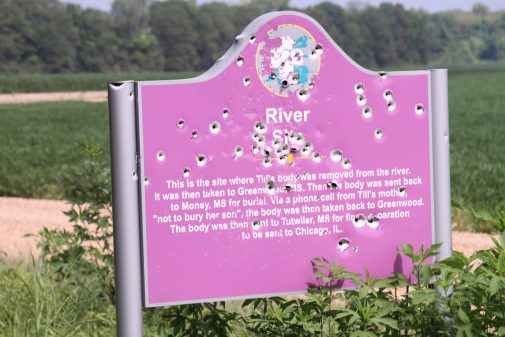Talk to Examine Civil Rights Tragedy
By
Westmont

Westmont alumnus Dave Tell ’98, associate professor of communication studies at the University of Kansas, explores the emergence of commemorations for the life of Emmett Till, a 14-year-old African-American teenager who was lynched in Mississippi in 1955. “The Emmett Till Memory Project,” sponsored by the Erasmus Society Lectureship endowment, is free and open to the public Thursday, Sept. 8 at 7 p.m. at Westmont’s Adams Center for the Visual Arts, Room 216.
Tell, who has written 25 short essays featured in the Emmett Till Memory Project, works at the intersection of rhetorical theory and cultural politics. His current research examines the commemorative explosion of Till’s life in two counties of the Mississippi Delta. Since 2005, granting agencies have invested more than $5.5 million, producing 10 roadside markers, three museums, a driving trail and a restored courthouse.
“This newfound commemorative infrastructure is uncoordinated, unevenly distributed, ideologically inconsistent and frequently vandalized,” Tell says. “For all these limitations, however, it ensures that the memory of Emmett Till has something it never had before: a material presence on the landscape of the Delta.”

Till, who was from Chicago and visiting relatives in Mississippi, was murdered after allegedly flirting with a white woman. His abductors beat, mutilated and shot him before throwing his body into the Tallahatchie River.
“Tell will conclude by talking about The Emmett Till Memory Project, a digital humanities initiative to change the terms on which Till is remembered in the Mississippi Delta,” says Deborah Dunn, professor of communication studies and lecture organizer. “His project is being funded by the National Endowment for the Humanities.”
Tell, who earned a doctorate from Penn State, wrote a book, “Confessional Crises: Confession and Cultural Politics in Twentieth-Century America,” which explains how the genre of confession has shaped and been shaped by some of the 20th century’s most intractable issues: sexuality, class, race, violence, religion, and democracy.
Tell won the Gerald R. Miller Outstanding Doctoral Dissertation Award by the National Communication Association and the Rhetoric Society of America Dissertation Award for his work, “The Politics of Public Confession: Expressivism and American Democracy.” He also won the Kenneth Burke Prize for “Beyond Mnemotechnics: Confession and Memory in Augustine.”
Filed under
Academics, Alumni, Campus Events, Lectures, Press Releases